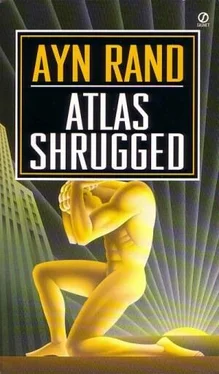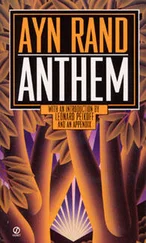The unit consisted of two stories in the shape of a small cube placed asymmetrically on top of a larger one. The first story had no windows, only a door studded with iron spikes; the second story had but one window, as if in reluctant concession to daylight, like a face with a single eye. The men on the staff of the Institute felt no curiosity about that structure and avoided the paths that led down to its door; nobody had ever suggested it, but they had the impression that the structure housed a project devoted to experiments with the germs of deadly diseases.
The two floors were occupied by laboratories that contained a great many cages with guinea pigs, dogs and rats. But the heart and meaning of the structure was a room in its cellar, deep under the ground; the room had been incompetently lined with the porous sheets of soundproofing material; the sheets had begun to crack and the naked rock of a cave showed through.
The unit was always protected by a squad of four special guards.
Tonight, the squad had been augmented to sixteen, summoned for emergency duty by a long-distance telephone call from New York. The guards, as well as all other employees of "Project F," had been carefully chosen on the basis of a single qualification: an unlimited capacity for obedience.
The sixteen were stationed for the night outside the structure and in the deserted laboratories above the ground, where they remained uncritically on duty, with no curiosity about anything that might be taking place below.
In the cellar room, under the ground, Dr. Ferris, Wesley Mouch and James Taggart sat in armchairs lined up against one wall. A machine that looked like a small cabinet of irregular shape stood in a corner across from them. Its face bore rows of glass dials, each dial marked by a segment of red, a square screen that looked like an amplifier, rows of numbers, rows of wooden knobs and plastic buttons, a single lever controlling a switch at one side and a single red glass button at the other. The face of the machine seemed to have more expression than the face of the mechanic in charge of it; he was a husky young man in a sweat-stained shirt with sleeves rolled above the elbows; his pale blue eyes were glazed by an enormously conscientious concentration on his task; he moved his lips once in a while, as if reciting a memorized lesson.
A short wire led from the machine to an electric storage battery behind it. Long coils of wire, like the twisted arms of an octopus, stretched forward across the stone floor, from the machine to a leather mattress spread under a cone of violent light. John Galt lay strapped to the mattress. He was naked; the small metal disks of electrodes at the ends of the wires were attached to his wrists, his shoulders, his hips and his ankles; a device resembling a stethoscope was attached to his chest and connected to the amplifier.
"Get this straight," said Dr. Ferris, addressing him for the first time.
"We want you to take full power over the economy of the country. We want you to become a dictator. We want you to rule. Understand?
We want you to give orders and to figure out the right orders to give.
What we want, we mean to get Speeches, logic, arguments or passive obedience won't save you now. We want ideas—or else. We won't let you out of here until you tell us the exact measures you'll take to save our system. Then we'll have you tell it to the country over the radio."
He raised his wrist, displaying a stop-watch. "I'll give you thirty seconds to decide whether you want to start talking right now. If not, then we'll start. Do you understand?"
Galt was looking straight at them, his face expressionless, as if he understood too much. He did not answer.
They heard the sound of the stop-watch in the silence, counting off the seconds, and the sound of Mouch's choked, irregular breathing as he gripped the arms of his chair.
Ferris waved a signal to the mechanic at the machine. The mechanic threw the switch; it lighted the red glass button and set off two sounds: one was the low, humming drone of an electric generator, the other was a peculiar beat, as regular as the ticking of a clock, but with an oddly muffled resonance. It took them a moment to realize that it came from the amplifier and that they were hearing the beat of Galt's heart.
"Number three," said Ferris, raising a finger in signal.
The mechanic pressed a button under one of the dials. A long shudder ran through Galt's body; his left arm shook in jerking spasms, convulsed by the electric current that circled between his wrist and shoulder. His head fell back, his eyes closed, his lips drawn tight. He made no sound.
When the mechanic lifted his finger off the button, Galt's arm stopped shaking. He did not move.
The three men glanced about them with an instant's look of groping.
Ferris' eyes were blank, Mouch's terrified, Taggart's disappointed. The sound of the thumping beat went on through the silence.
"Number two," said Ferris, It was Galt's right leg that twisted in convulsions, with the current now circling between his hip and ankle. His hands gripped the edges of the mattress. His head jerked once, from side to side, then lay still.
The beating of the heart grew faintly faster.
Mouch was drawing away, pressing against the back of his armchair.
Taggart was sitting on the edge of Ms, leaning forward.
"Number one, gradual," said Ferris.
Galt's torso jerked upward and fell back and twisted in long shudders, straining against his strapped wrists—as the current was now running from his one wrist to the other, across his lungs. The mechanic was slowly turning a knob, increasing the voltage of the current; the needle on the dial was moving toward the red segment that marked danger. Galt's breath was coming in broken, panting sounds out of convulsed lungs.
"Had enough?" snarled Ferris, when the current went off.
Galt did not answer. His lips moved faintly, opening for air. The beat from the stethoscope was racing. But his breath was falling to an even rhythm, by a controlled effort at relaxation.
"You're too easy on him!" yelled Taggart, staring at the naked body on the mattress.
Galt opened his eyes and glanced at them for a moment. They could tell nothing, except that his glance was steady and fully conscious. Then he dropped his head again and lay still, as if he had forgotten them.
His naked body looked strangely out of place in this cellar. They knew it, though none of them would identify that knowledge. The long lines of his body, running from his ankles to the flat hips, to the angle of the waist, to the straight shoulders, looked like a statue of ancient Greece, sharing that statue's meaning, but stylized to a longer, lighter, more active form and a gaunter strength, suggesting more restless an energy—the body, not of a chariot driver, but of a builder of airplanes. And as the meaning of a statue of ancient Greece—the statue of man as a god—clashed with the spirit of this century's halls, so his body clashed with a cellar devoted to prehistorical activities. The clash was the greater, because he seemed to belong with electric wires, with stainless steel, with precision instruments, with the levers of a control board. Perhaps—this was the thought most fiercely resisted and most deeply buried at the bottom of his watchers sensations, the thought they knew only as a diffused hatred and an unfocused terror—perhaps it was the absence of such statues from the modern world that had transformed a generator into an octopus and brought a body such as his into its tentacles.
"I understand you're some sort of electrical expert," said Ferris, and chuckled. "So are we—don't you think so?"
Two sounds answered him in the silence: the drone of the generator and the beating of Galt's heart.
"The mixed series!" ordered Ferris, waving one finger at the mechanic.
Читать дальше










